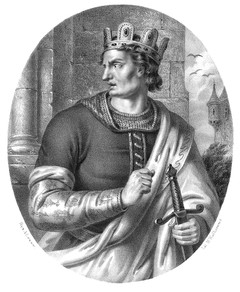Boleslaus II of Poland
| Bolesław II the Generous | |
|---|---|

19th century portrait by Aleksander Lesser
|
|
| King of Poland | |
| Reign | 1076–1079 |
| Coronation | 26 December 1076 Gniezno Cathedral, Poland |
| Predecessor | Mieszko II Lambert |
| Successor | Przemysł II |
| Duke of Poland | |
| Reign | 1058–1076 |
| Predecessor | Casimir I the Restorer |
| Successor | Władysław I Herman |
| Born | c. 1042 Kingdom of Poland |
| Died | 2 or 3 April 1081/1082 Kingdom of Hungary |
| Burial | Ossiach Abbey (disputed) |
| Spouse | Wyszesława of Kiev |
| Issue | Mieszko |
| Dynasty | Piast |
| Father | Casimir I the Restorer |
| Mother | Maria Dobroniega of Kiev |
| Religion | Roman Catholic |
Bolesław II the Generous, also known as the Bold and the Cruel (Polish: Bolesław II Szczodry ![]() Polish ; Śmiały; Okrutny; c. 1042 – 2 or 3 April 1081 or 1082), was Duke of Poland from 1058 to 1076 and third King of Poland from 1076 to 1079. He was the eldest son of Duke Casimir I the Restorer and Maria Dobroniega of Kiev.
Polish ; Śmiały; Okrutny; c. 1042 – 2 or 3 April 1081 or 1082), was Duke of Poland from 1058 to 1076 and third King of Poland from 1076 to 1079. He was the eldest son of Duke Casimir I the Restorer and Maria Dobroniega of Kiev.
Bolesław II is considered to have been one of the most capable of the Piast rulers. In 1075 he re-established the Archdiocese of Gniezno (consecrated in 1064) and founded the Diocese of Płock. He established Benedictine monasteries in Mogilno, Lubin and Wrocław. Bolesław II was also the first Polish monarch to produce his own coinage in quantity great enough to replace the foreign coins prevalent in the country during the reigns of the first Piast kings. He established royal mints in Kraków and Wrocław and reformed the coinage, which brought considerable revenue into the royal coffers. All these efforts had an enormous influence on the economic and cultural development of the country.
...
Wikipedia
